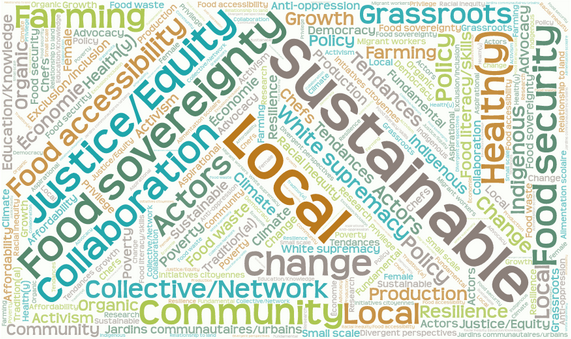Results from the State of the Movement Survey
Thank you all for your participation in the State of the Movement survey. The world might not look the same as when we launched this survey back in February 2020, but we want to share our results with you from what we gathered earlier in the year. We want to extend our gratitude for the time you took to participate.
High level results
Out of the 98 participants who filled the survey, 24 chose to complete the form in French (almost exclusively from Québec) and 74 in English. For English respondents, all provinces and territories are represented except for Prince Edward Island, Nunavut and Yukon. A separate engagement process had been planned with Indigenous Peoples to get their input given that surveys are not an ideal or appropriate tool to engage First Nations, Métis and Inuit communities, but the pandemic resulted in the need to gather information in other ways as explained below.
We asked two key questions about momentum, opportunities, issues and challenges in the food movement(s). Here are some of your answers:
Momentum and opportunities (based on the responses in English):
1. Local agriculture and farmers:
- Support of local farmers and increase in farmers markets and direct purchasing (farm to fork)
- Support for sustainable production and agroecology
2. School food and youth:
- Increase in food literacy and food programs in school and amongst youth
3. Environment and climate:
- More unified focus and global discourse around the connection between environment, climate and food systems - namely Sustainable Development Goals as an example
- More discourse on the importance of protecting land, water and biodiversity
4. Justice and diversity:
- There has been more space for adressing racial discrimination and white supremacy in the food-system
- Increase in diversity and underrepresented groups of Black and Indigenous farmers and more active collaboration in decision making
5. Income and food security:
- More work on income solutions and programs, such as movements demanding for basic income
- Increase in discourse around the accessibility component of healthy food
Momentum and opportunities (based on the responses in French):
- Public/citizen interest trends in urban agriculture, solidarity initiatives, sustainable agriculture, etc.
- Mobilization of the nonprofit sector and social economy
- Increase in collaboration on intraregional and intersectoral levels
- Increase in school food initiatives and food education
- Increase in interest, initiatives and participation in food waste recovery
Issues and challenges (based on the responses in English):
1. Big corporate food system:
- The dominance of the industrial conventional food system, influenced by corporate control
- Big dependence on food importation and global markets which leads to high vulnerability in the disruption of the food chain
2. Justice and divergence within the movement:
- Questions of equity and reconciliation within the food movement, as well as ignorance of how poverty, racism, classism, sexism and white supremacy, shape food inequalities and are not addressed enough
- Divergent focuses and messages within the food movement and lack of collective priority-setting and collaboration
3. Income and food insecurity:
- Root cause of food insecurity is not addressed, only band-aid solutions are presented and talked about
- Not properly addressing issues of poverty and the price of sustainable, local foods which are not accessible to many
4. Funding:
- Unreliable funding models; funding by programs vs. building a movement, lack of capacity
Issues and challenges (based on the responses in French):
- Lack of funding for organizations and lack of focus from government investments and priorities
- Challenge of bringing together a variety of interests and definitions within the food movement, which leads to lack of cohesion, competition, and working in silos
- Lack of overall societal will, larger public mobilization, and engagement from citizens
- Dominance of lobbying from agribusiness and agrochemical giants
Based on your responses, this is what the term “food movement(s)” represents:

Voices of Black, Indigenous and People of Colour
Due to the pandemic and the timing of the survey, we weren’t able to pursue the distinct process by, with, and for Indigenous peoples as planned. Given the current context and limited resources and time, we have participated in various online trainings on Indigenous food sovereignty & Black food sovereignty in order to inform our process when timing and resources allow.
The common theme is that there needs to be space and place for leadership of Black, Indigenous and people of colour to be heard, valued, and taken into consideration in decision making.
With this input, we were happy to have hosted a successful event, Cultivating Change, held from November 12-18, 2020 where we held a series of online conversations and workshops exploring the intersections between food systems, anti-racism, decolonization, and environmental justice movements. Cultivating Change showcased the work of Indigenous, Black, and racialized food leaders. We also discussed building consciousness and capacity for anti-racist, decolonized approaches, and allyship within the food movement.
We want to heartily thank everyone who participated in the State of the Movement survey and Cultivating Change, and we look forward to continuing to learn and unlearn together.

